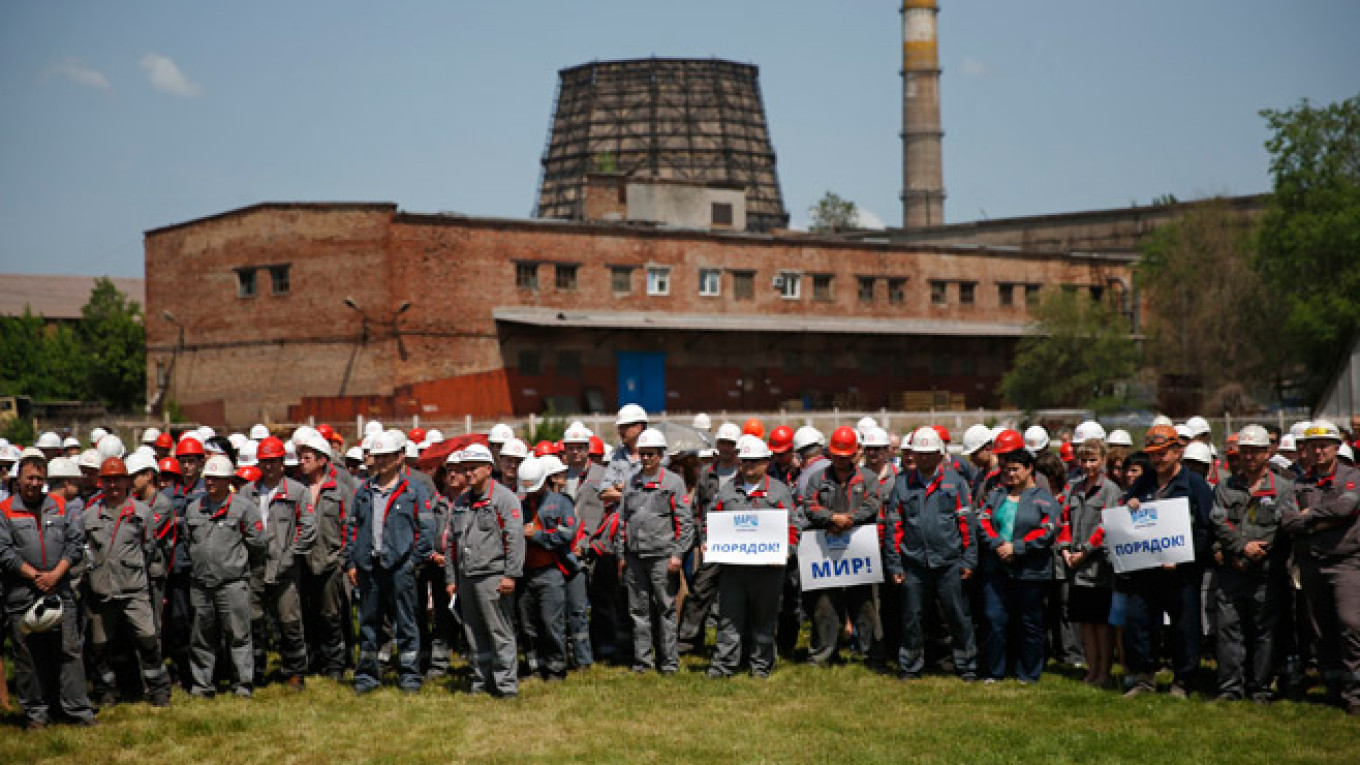Pro-Russian insurgents fighting Ukrainian government forces faced public dismay and a new challenge from the country's richest man on Tuesday, while Russia's Defense Ministry said its units have started dismantling their camps in the border regions.
A day after President Vladimir Putin issued a pullout order in an apparent bid to ease tensions with the West over Ukraine, the Russian Defense Ministry said that its forces in the Bryansk, Belgorod and Rostov regions were preparing for a journey to their home bases.
NATO, which estimates that Russia has 40,000 troops along the border with Ukraine, said it is watching the situation closely, but could not yet confirm a change. NATO spokeswoman Oana Lungescu challenged the Russians Tuesday "to prove that they are doing what they are saying."
The Defense Ministry said it would take time for troops to dismantle their camps and load equipment on trucks for a march to railway stations. It did not say how many troops were being pulled out from the three regions or how long it would take.
Footage broadcast by Russian television showed what it said were troops on their way out, but their exact locations and routes remained unclear.
Putin's order made it clear that he has no immediate intention of sending the Army into eastern Ukraine, where pro-Russian insurgents have seized government buildings and clashed with Ukrainian government forces in weeks of fighting that has left dozens dead.
On Tuesday, the rebels continued to exchange fire with government forces on the outskirts of the eastern city of Slovyansk, which has been the epicenter of clashes. Yekaterina Len, a 61-year-old resident of the city whose house was hit by a mortar shell that appeared to be fired by government troops, burst into tears as she looked at the wreckage. She survived the shelling by spending the night with neighbors.
Len and other residents of Slovyansk sounded exasperated and angry with both the warring sides. Some said that many houses were hit when rebels moved around the area, shooting at government troops and drawing retaliatory fire.
"They must stop with this banditry so that there can be peace," said another Slovyansk resident, Lina Sidorenko. "How much longer can this go on? We had a united country and now look what has happened."
Ukraine's richest man, metals tycoon Rinat Akhmetov, rode the wave of public dismay with the hostilities to toughen his stance against the rebellion, saying it has devastated the eastern regions that form the nation's industrial heartland.
In a statement Akhmetov issued a strong call for an end to the mutiny in the east, which he described as a "fight against the citizens of our region."
"Is looting in cities and taking peaceful citizens hostage a fight for the happiness of our region? No, it is not!" Akhmetov said.
He called on all workers in the region to hold a "peaceful warning protest" Tuesday at the companies where they work by blowing sirens "in support of peace and against bloodshed" and continue such actions in the following days.
Ukraine's Interior Minister Arsen Avakov quickly hailed Akhmetov's move, saying on Facebook that "the people's power and energy will sweep the terrorist scum away better than any counter-terrorist operation."
Akhmetov had initially taken a noncommittal stance as the mutiny engulfed the east, drawing criticism from the authorities in Kiev. But last week his company organized citizen patrols of steelworkers working alongside police in the Black Sea port of Mariupol to help improve security and get insurgents to vacate the buildings they had seized.
Russia has scathingly criticized the new Ukrainian authorities, who came to power in February after the toppling of a pro-Russian president, for using the military against the rebellion. The rebels declared the Donetsk and Luhansk regions independent following referendums earlier this month, which Ukraine and the West have denounced as a sham.
However, Putin's order to withdraw troops from areas near the border and his support for Ukraine's presidential vote this Sunday, which he had previously sought to postpone, appeared to reflect a desire to de-escalate the worst crisis between Russia and the West since the Cold War and avoid further Western sanctions.
The U.S. and the European Union have imposed travel bans and asset freezes on members of Putin's inner circle over Russia's annexation of Crimea. They have threatened to target entire sectors of the Russian economy with sanctions if Russia tries to grab more land or attempts to derail Ukraine's presidential election.
A Message from The Moscow Times:
Dear readers,
We are facing unprecedented challenges. Russia's Prosecutor General's Office has designated The Moscow Times as an "undesirable" organization, criminalizing our work and putting our staff at risk of prosecution. This follows our earlier unjust labeling as a "foreign agent."
These actions are direct attempts to silence independent journalism in Russia. The authorities claim our work "discredits the decisions of the Russian leadership." We see things differently: we strive to provide accurate, unbiased reporting on Russia.
We, the journalists of The Moscow Times, refuse to be silenced. But to continue our work, we need your help.
Your support, no matter how small, makes a world of difference. If you can, please support us monthly starting from just $2. It's quick to set up, and every contribution makes a significant impact.
By supporting The Moscow Times, you're defending open, independent journalism in the face of repression. Thank you for standing with us.
Remind me later.


